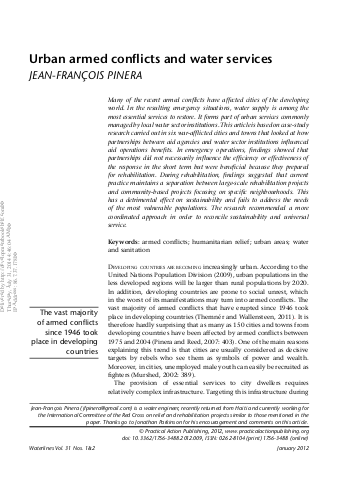
Many of the recent armed conflicts have affected cities of the developing world. In the resulting emergency situations, water supply is among the most essential services to restore. It forms part of urban services commonly managed by local water sector institutions. This article is based on case-study research carried out in six war-afflicted cities and towns that looked at how partnerships between aid agencies and water sector institutions influenced aid operations benefits. In emergency operations, findings showed that partnerships did not necessarily influence the efficiency or effectiveness of the response in the short term but were beneficial because they prepared for rehabilitation. During rehabilitation, findings suggested that current practice maintains a separation between large-scale rehabilitation projects and community-based projects focusing on specific neighbourhoods. This has a detrimental effect on sustainability and fails to address the needs of the most vulnerable populations. The research recommended a more coordinated approach in order to reconcile sustainability and universal service.
Resource collections
- UN Habitat - Urban Response Collection
- Urban Response - Urban Crisis Preparedness and Risk Reduction
- Urban Response Collection - Community Engagement and Social Cohesion
- Urban Response Collection - Economic Recovery
- Urban Response Collection - Environment and Climate Change
- Urban Response Collection - Housing, Land and Property
- Urban Response Collection - Urban Crisis Response, Recovery and Reconstruction
- Urban Response Collection - Urban Resilience